Diplomatic Bluebook 2025
Chapter 2
Japan's Foreign Policy by Region
4 Southeast Asia
(1) Indonesia
Indonesia is a major country in the Southeast Asia region with the fourth largest population in the world (at approximately 280 million people) and situated in a strategic location on sea lanes such as the Strait of Malacca, and plays a leading role in the Association of Southeast Asian Nations (ASEAN). Moreover, as ASEAN's sole G20 member and as one of the leading countries in the Global South, its importance in addressing regional and international challenges has been increasing.
President Joko Widodo served two terms over a ten-year period beginning in October 2014 and concluding in October 2024. During his time in office, he primarily focused on economic sectors, most notably infrastructure development. Due to the impact of the COVID-19 pandemic, economic growth, which had consistently remained around 5 percent, turned negative in 2020. However, it has recovered to positive growth in the mid-5 percent range since 2022. Japan has actively cooperated in various fields including infrastructure development, which was a priority area for President Joko.
In February, Indonesia held its presidential election, and Prabowo Subianto, who was then Minister of Defense, was elected. Prior to his inauguration in October, President-elect Prabowo visited Japan in April, where he exchanged views with Prime Minister Kishida and other government officials, confirming that they would further advance cooperation between the two countries.
In July, Foreign Minister Kamikawa met with Foreign Minister Retno Lestari Priansari Marsudi on the occasion of the ASEAN-related Foreign Ministers' Meetings, and in August, Foreign Minister Kamikawa and Minister of Trade Zulkifli Hasan signed a Protocol Amending the Agreement between Japan and the Republic of Indonesia for an Economic Partnership.
Former Japanese Minister for Foreign Affairs KOMURA Masahiko attended the Indonesian Presidential inauguration ceremony in October as the Ambassador on Special Mission. In the inaugural speech, President Prabowo stated that he would focus on reducing poverty and on improving self-sufficiency in food and energy. After his inauguration, the cabinet list was announced, and a new administration was formed. Members of political parties that had won seats in the parliamentary election which was held alongside the presidential election joined the cabinet or expressed their support for the administration, resulting in a de facto all-ruling party system in the national legislature.
In October, when Indonesia's new government was inaugurated, Foreign Minister Iwaya held a telephone call with Foreign Minister Sugiono, confirming their collaboration to further strengthen the relationship between the two countries as “Comprehensive Strategic Partners,” and confirming their close cooperation on regional and international affairs. In November, Foreign Minister Iwaya and Foreign Minister Sugiono held informal talks on the sidelines of the APEC Ministerial Meeting in Peru, and Prime Minister Ishiba and President Prabowo also held informal talks on the sidelines of the APEC Economic Leaders' Meeting. In these talks between the leaders and the foreign ministers, they concurred to further promote cooperation in the field of security in addition to the economy. Such interactive communications demonstrate that active exchanges have been taking place at a high level between the two countries.
(2) Cambodia
Cambodia, located in the Mekong region, is a key country in strengthening connectivity and narrowing the development gap in the region. Cambodia had been averaging approximately 7% growth for the past 20 years, and, although GDP growth in 2020 was negative due to the impacts of COVID-19, since 2022 it has returned to positive growth of around 5.0%.
In terms of domestic affairs, the general election held in July 2023 saw the ruling Cambodian People's Party win a landslide victory after the Candlelight Party, which had become the largest opposition party in the 2022 commune council elections, was denied the right to register its candidates. Hun Sen, who had served as Cambodia's Prime Minister for many years, stepped down from his post, and a new Cabinet headed by Prime Minister Hun Manet was formed in August 2023.
Japan has cooperated with Cambodia's peace, reconstruction, and development efforts, including in the first full-scale deployment of UN peacekeeping operations (PKO) in 1992. Moreover, in recent years, investment by Japanese companies has progressed smoothly and economic relations have expanded, and cooperation is also progressing in new fields such as security and digital technologies. In 2023, the relationship between the two countries was elevated to a Comprehensive Strategic Partnership. On the international stage, Japan and Cambodia have drawn on their collaboration in mine-clearance efforts in Cambodia to assist third countries, most notably Ukraine, with mine-clearance action.
In July, Foreign Minister Kamikawa visited Cambodia and, in a Japan-Cambodia Foreign Ministers' Meeting, concurred to promote “three new cooperation approaches” in social infrastructure development, maritime connectivity enhancement, and humanitarian mine action, aimed at strengthening Cambodia's sustainability and co-creating social value, and affirmed their commitment to cooperate in regional and international fora.
(3) Singapore
Singapore is the most economically advanced country within ASEAN. Based on its omnidirectional foreign policy, the country maintains friendly relations with major countries including the U.S. and China.
In May, Singapore saw a change in prime minister for the first time in 20 years, with Deputy Prime Minister and Minister for Finance Lawrence Wong becoming the fourth Prime Minister. Prime Minister Wong, who continues to serve as Finance Minister, is promoting economic policies, measures to address the low birthrate, and housing policies on the basis of the People's Action Party's stable domestic governance. In May, Prime Minister Kishida held a telephone call with Prime Minister Wong, shortly after his inauguration, and welcomed the progress in cooperation across a wide range of areas, concurring to coordinate on various issues to further strengthen bilateral relations.
At the ASEAN-related Foreign Ministers' Meetings in Laos in July, and again during a Japan-Singapore Foreign Ministers' Telephone Meeting in October, Foreign Minister Kamikawa exchanged views with Foreign Minister Vivian Balakrishnan, confirming that, with Singapore serving as ASEAN Country Coordinator for Japan from summer 2024 and looking ahead to the 60th anniversary of the establishment of diplomatic relations between the two countries in 2026, Japan and Singapore will work together closely. The two countries have worked together to provide developing countries with technical assistance through the “Japan-Singapore Partnership Program for the 21st Century (JSPP21),” which was signed in 1997. To date, they have provided approximately 410 training courses with roughly 7,600 participants from ASEAN countries and other regions (as of the end of July 2024).
The Japan Creative Centre (JCC), which was opened in Singapore in 2009 as a platform to promote Japanese culture, hosted a variety of outreaches and events.
(4) Thailand
Thailand is a constitutional monarchy located at the heart of the Southeast Asian mainland (Mekong region). It is also one of the original member states of ASEAN, which was born from the “Bangkok Declaration” in 1967, and holds significant geopolitical importance. Thailand has become a major production center for Japanese companies, including the automobile industry, and today Thailand is an indispensable part of the Japanese economy as a key part of supply chains, with close to 6,000 Japanese companies operating and more than 70,000 Japanese nationals living in Thailand.
Continuing on from 2023, 2024 was also a year of significant domestic political changes. In August, the Constitutional Court ordered the dissolution of the Move Forward Party, the largest opposition party in the House of Representatives (legislature), as well as the suspension of eligibility for election for all executive members of the party for 10 years, ruling that its electoral pledge to amend the lèse-majesté law during the previous year's legislative election carried an intent to overthrow the constitutional monarchy. The Court also found that the appointment of a minister who had previously been convicted violated the ethical standards set forth in the Constitution and consequently removed Prime Minister Srettha Thavisin from office. As a result, former Prime Minister Thaksin Shinawatra's second daughter and leader of the Pheu Thai Party, Paetongtarn Shinawatra, became Prime Minister, and a new government was formed in September.
Bilateral relations between Japan and Thailand have continued to advance steadily. In May, Foreign Minister Kamikawa met with Foreign Minister Maris Sangiampongsa, who was visiting Japan, and confirmed their intention to strengthen cooperation in a variety of fields, including the economy. In October, on the sidelines of the ASEAN-related Summit Meetings, Prime Minister Ishiba had an informal talk with Prime Minister Paetongtarn, and in November, at the APEC Ministerial Meeting in Peru, Foreign Minister Iwaya had an informal talk with Foreign Minister Maris, where they shared the intention to deepen cooperation both bilaterally and in international fora.
(5) Timor-Leste
Timor-Leste, the first country that achieved independence in the 21st century, is strategically important in the Indo-Pacific region, and is situated in a critical sea lane between Australia and Indonesia. Japan established diplomatic relations with Timor-Leste upon its independence in 2002. In 2022, the country, which celebrated the 20th anniversary of its independence, has realized peace and stability with the support of the international community, and it has also been making nation building efforts based on the principle of democracy. As a result of the election for the National Parliament held in May 2023, a new government led by Prime Minister Kay Rala Xanana Gusmão was inaugurated in July. As its economy is highly dependent on natural resources such as petroleum and natural gas, the country has been working on industrial diversification as the highest national priority. On the diplomatic front, Timor-Leste still continues to work toward its accession to ASEAN in coordination with relevant countries. In May 2023, ASEAN adopted a roadmap for Timor-Leste's accession to ASEAN.
In July, Foreign Minister Kamikawa attended the ASEAN-related Foreign Ministers' Meetings and held a meeting with the Minister of Foreign Affairs and Cooperation Bendito dos Santos Freitas, where they exchanged views on bilateral relations and various issues facing the region and the international community. In August, Parliamentary Vice-Minister for Foreign Affairs Komura visited Timor-Leste and met with President Ramos-Horta, Prime Minister Gusmão, and Vice Prime Minister Francisco Kalbuadi Lay. They confirmed that upgrading the relationship between the two countries to a “Comprehensive Partnership” was a major achievement, and that they would use this visit as an opportunity to further develop bilateral relations, deepen cooperation in a wide range of areas such as security, economy, and people-to-people exchanges, and cooperate on regional and international situations. During the meeting with Minister of Foreign Affairs and Cooperation Bendito dos Santos Freitas, the two countries signed and exchanged notes for Grant Aid for “the Project for the Improvement of Guido Valadares National Hospital.” In October, a memorandum of cooperation on the technical intern training program was signed, and concrete cooperation is progressing between related organizations and private companies. As an example of accepting Timor Leste technical intern trainees, Kochi Prefecture has accepted 16 trainees in the agricultural sector and two in the accommodation sector.
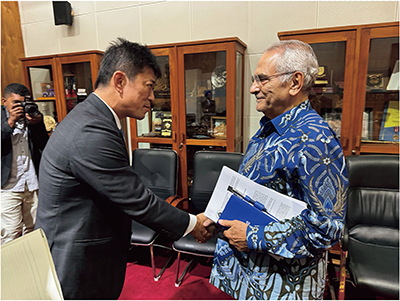 Parliamentary Vice-Minister for Foreign Affairs Komura paying a courtesy call on President Ramos-Horta (August 13, Timor-Leste)
Parliamentary Vice-Minister for Foreign Affairs Komura paying a courtesy call on President Ramos-Horta (August 13, Timor-Leste)(6) The Philippines
The Philippines is a maritime nation situated at a strategic point on sea lanes, and shares strategic interests with Japan. Although the Philippines' economy experienced negative growth in 2020 due to the impact of COVID-19, in 2022 the country's economy recorded a growth rate of 7.6%, its highest in the past 46 years, and in 2023 it maintained an economic growth rate of 5.5%, making it one of the ASEAN countries with the highest economic growth rates. Now in his third year in office, President Ferdinand Marcos Jr. continues to prioritize improving the quality of lives of the people through food, education, health, employment, and social security, as well as investments in public infrastructure. As for the Mindanao Peace Process, despite the delays seen in the decommissioning and disarmament work with the Moro Islamic Liberation Front (MILF), based on the amended Bangsamoro Organic Law, the effort to conceive an autonomous government is continuing toward 2025.
Between Japan and the Philippines, following mutual visits by the two countries' leaders in 2023, 2024 also saw visits at various levels, thereby further advancing the deepening of their Strategic partnership. In July, Foreign Minister Kamikawa attended the Second Japan-Philippines Foreign and Defense Ministerial Meeting (“2+2”) that was held in Manila and signed the Japan-Philippines Reciprocal Access Agreement (RAA). In August, State Minister for Foreign Affairs TSUGE Yoshifumi paid a courtesy call on Secretary for Foreign Affairs Enrique A. Manalo in the Philippines. In addition, at the ASEAN-related Summit Meetings in October, Prime Minister Ishiba held informal talks with President Marcos and confirmed that the two countries would further strengthen their cooperation. Moreover, during the Japan-Philippines Foreign Ministers' Telephone Meeting in October and at the Japan-Philippines Foreign Ministers' Meeting held during the G7 Foreign Ministers' Meeting in November, Foreign Minister Iwaya confirmed collaboration on addressing regional and international issues, including the issue of the South China Sea, and on pursuing the peaceful resolution of disputes. In the security field, in December, continuing on from 2023, Japan and the Philippines signed and exchanged notes concerning the provision of support equipment, including the Air Surveillance Radar System that has already been transferred, under the Government of Japan's Official Security Assistance (OSA). In addition to the bilateral cooperation between Japan and the Philippines, there has also been steady progress in trilateral cooperation between Japan, the U.S., and the Philippines. Following the March Japan-U.S.-Philippines Vice Minister's Meeting, in April the inaugural Japan-U.S.-Philippines Summit was held, and in December the director-level Japan-U.S.-Philippines Maritime Dialogue took place, demonstrating that concrete initiatives in a wide range of areas, such as security and economic security, are continuing to advance Japan-U.S.-Philippines cooperation. (See the Special Feature on page 74.)
(7) Brunei
Its abundance in natural resources has enabled Brunei to realize a high economic standard and generous social welfare, and as such, the country enjoys political and economic stability. Under Brunei's constitutional monarchy, the Sultan concurrently serves as the Prime Minister, Minister of Finance and Economy, Minister of Defense and Minister of Foreign Affairs. Located in the center of Southeast Asia, Brunei is one of the countries involved in the issue of the South China Sea and has adopted a balanced diplomacy built on the pillar of promoting ASEAN unity and centrality.
Brunei's economy is supported by natural gas production and oil refining ventures, but the Government of Brunei is aiming for economic diversification to avoid overreliance on energy resources.
Japan and Brunei established diplomatic relations in 1984, and the two countries are developing excellent bilateral relations in various areas. March 2024 marked the 40th anniversary of the establishment of diplomatic relations between the two countries, and Crown Prince Haji Al-Muhtadee Billah and Crown Princess Sarah of Brunei made an Official Visit to Japan. Crown Prince Al-Muhtadee Billah met with Prime Minister Kishida, during which they exchanged views on bilateral cooperation and regional and global issues, and elevated their bilateral relationship to a “Strategic partnership.” Japan and Brunei are also continuing to build a close relationship between the imperial and royal families. (See the Column on page 75.) Brunei is an important country for stable energy supply to Japan. Around 50% of Brunei's liquefied natural gas (LNG) exports are bound for Japan, and LNG from Brunei makes up around 4% of the total LNG import to Japan.
(8) Viet Nam
Located next to sea lanes in the South China Sea and sharing a long border with China, Viet Nam is a geopolitically important country. Given that the country embraces the third largest population in Southeast Asia, and is experiencing a surge in the number of people in middle-income brackets, Viet Nam is a promising market. At the same time, since the COVID-19 pandemic, the movement to diversify supply chains has been gaining momentum, and foreign firms, including Japanese companies, have continued moving their production bases to Viet Nam. The country is promoting GX (Green Transformation) and DX (Digital Transformation) with the aim of joining the ranks of developed countries by 2045 and of becoming carbon neutral by 2050, and is currently striving to achieve stable economic growth through the stabilization of the macroeconomy including control of inflation, the promotion of foreign investment by the development of infrastructure and the improvement of the investment environment. Viet Nam's economic growth rate from 2020 to 2021 fell to around the 2% level due to severe lockdowns caused by the spread of COVID-19, however growth rebounded to 8.02% in 2022 and 5.05% in 2023, and the 2024 economic growth rate is estimated at approximately 6.0%. In a short span of time, Viet Nam's top leadership underwent changes, including the successive resignations of the State President and the National Assembly Chairman and the death of General Secretary of the Communist Party of Viet Nam Nguyen Phu Trong (the state funeral was attended by former Japanese Prime Minister SUGA Yoshihide as a Special Envoy of Prime Minister Kishida), but as of October a new leadership team under General Secretary To Lam, President Luong Cuong, Prime Minister Pham Minh Chinh, and National Assembly Chairman Tran Thanh Man has taken office.
Japan and Viet Nam established diplomatic relations on September 21, 1973. In 2023, on the 50th anniversary of the establishment of diplomatic relations, the Japan-Viet Nam bilateral relationship was elevated to a “Comprehensive Strategic Partnership for Peace and Prosperity in Asia and the World,” and over five hundred commemorative events were held in both countries.
Under the new bilateral partnership, 2024 continued to see active visits by dignitaries and high-level meetings. In August, Foreign Minister Bui Thanh Son visited Japan, where he and Foreign Minister Kamikawa held the Viet Nam-Japan Cooperation Committee meeting and a Japan-Viet Nam Foreign Ministers' Meeting, at which they concurred to advance cooperation in a variety of fields, including economic affairs, people‐to‐people exchanges, subnational exchanges, and security. In September, Parliamentary Vice-Minister for Foreign Affairs Komura visited Viet Nam to participate in an international forum hosted in Ho Chi Minh City. Prime Minister Ishiba held a Japan-Viet Nam Summit Meeting with Prime Minister Chinh on the sidelines of the October ASEAN-related Summit Meetings and a Japan-Viet Nam Summit Meeting with President Cuong at the November APEC Economic Leaders' Meeting, sharing the intention to deepen cooperation in all areas, including security. In December, National Assembly Chairman Man visited Japan and met with House of Representatives Speaker NUKAGA Fukushiro and House of Councillors President SEKIGUCHI Masakazu, where they concurred on the importance of strengthening people‐to‐people exchanges. Furthermore, the number of Vietnamese nationals residing in Japan, primarily technical intern trainees, is continuing to increase, from approximately 40,000 in 2011 to over 600,000 by the end of June 2024, making Vietnamese nationals the second largest number of foreign residents in Japan by country after China.
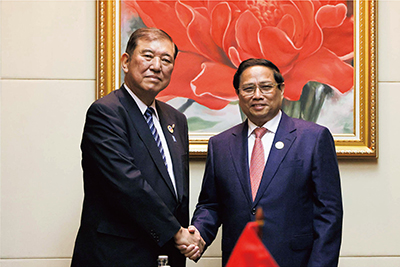 Japan-Viet Nam Summit Meeting (October 11, Vientiane, Laos; Photo: Official Website of the Prime Minister of Japan and His Cabinet)
Japan-Viet Nam Summit Meeting (October 11, Vientiane, Laos; Photo: Official Website of the Prime Minister of Japan and His Cabinet)(9) Malaysia
Comprised of the Peninsular Malaysia of the Malay Peninsula and the East Malaysia of Borneo, Malaysia is a geopolitically important country facing the South China Sea and the Strait of Malacca that is situated in a crucial spot in the Indian and Pacific Oceans. Furthermore, it is a federal state comprised of 13 states and three federal territories, and also a multiethnic state comprised of Bumiputra (Malay including indigenous peoples) (70%), Chinese (23%) and Indian people (7%), among others.
In May, Prime Minister Dato' Seri Anwar made his second visit to Japan since December 2023 and held a Japan-Malaysia Summit Meeting with Prime Minister Kishida. During their talks, the two leaders concurred to cooperate in further developing Japan-Malaysia relations under the Comprehensive and Strategic Partnership. In February and April, the Japan Maritime Self-Defense Force and the Royal Malaysian Navy conducted joint exercises. In the field of human resources development, under the Look East Policy, which was begun by Prime Minister Mahathir bin Mohamad in 1982, approximately 28,000 Malaysian people have studied or have been trained in Japan so far. The two countries have been cooperating in making the Malaysia Japan International Institute of Technology (MJIIT), which was opened in September 2011, a base for Japanese-style engineering education in ASEAN countries. Moreover, in September 2024 the University of Tsukuba opened a branch campus in Malaysia in order to further contribute to the development of human resources who will bear the future of Malaysia, and there are active exchanges in the fields of education and the humanities. On the economic front, roughly 1,600 Japanese companies have been operating in Malaysia, which demonstrates a continued close relationship between the two countries.
(10) Myanmar
Since the coup d'état by the Myanmar military on February 1, 2021, clashes have erupted across the country between the military and both pro-democracy forces and various ethnic armed organizations, resulting in a deteriorating security situation and numerous civilian casualties. Moreover, a severe shortage of foreign currency, together with disruptions to fuel imports and rising inflation, has dealt a heavy blow to people's livelihoods and economic activity.
On the political front, the enactment in February of the People's Military Service Law introduced conscription, prompting many young people to flee abroad and perpetuating social unrest. Against this backdrop, the State Administration Council, chaired by the Commander-in-Chief of Defence Services, conducted a national census beginning in October in preparation for a general election, and released provisional results at the end of December. Notably, the National League for Democracy (NLD), which had won a landslide in the previous general election, was deregistered under the Political Parties Registration Law newly enacted in 2023.
On February 1, 2024, marking three years since the coup d'état, the Government of Japan issued a Foreign Minister's statement condemning the absence of any progress toward political reforms, including the immediate cessation of violence, the release of detainees, and the prompt restoration of a democratic political system, which Japan has consistently urged the Myanmar military to undertake. The statement called on the military to release NLD leaders, including State Counsellor Aung San Suu Kyi, and to concretely engage in peaceful problem‐solving through dialogue among all parties. In May, while visiting Japan, representatives of ethnic organizations paid a courtesy call on Parliamentary Vice-Minister for Foreign Affairs Komura, where they exchanged views on the situation in Myanmar.
Based on the belief that it is important for ASEAN to respond in a unified manner to resolve the situation, Japan is working with the international community to fully support ASEAN's efforts, including the implementation of the ASEAN “Five-Point Consensus.”(26) In addition, as a member of the UN Security Council, Japan has actively contributed to various discussions on Myanmar and has responded in cooperation with the international community, including co-sponsoring the Human Rights Council resolution (April) and the UN General Assembly resolution (December) on the human rights situation in Myanmar.
Furthermore, in order to improve the worsening humanitarian situation in Myanmar, since the coup d'état on February 1, 2021, through international organizations and NGOs, Japan has been continuously providing humanitarian assistance in a way that directly benefits the people of Myanmar, totaling approximately 152.00 million U.S. dollars (as of the end of December 2024).
- (26) The Five-Point Consensus was announced at the ASEAN Leaders' Meeting held on April 24, 2021. It calls for (1) immediate cessation of violence, (2) commencement of constructive dialogue among all parties concerned, (3) mediation of the dialogue process by a special envoy of the ASEAN Chair, (4) providing humanitarian assistance through the AHA Centre, and (5) visiting Myanmar to meet with all parties concerned by the ASEAN special envoy and delegation.
(11) Laos
Laos is a landlocked country bordering China, Myanmar, Thailand, Cambodia, and Viet Nam, and therefore is a key country for Mekong connectivity. Prime Minister Sonexay Siphandone has continued to address economic and fiscal issues on the domestic front, and at the 7th Ordinary Session of the National Assembly's 9th Legislature in June, he stated that he was working to resolve challenges such as inflation, the depreciation of the kip (the currency of Laos), surging prices, and external debt.
Meanwhile, Laos served as the ASEAN Chairmanship for 2024, and hosted the ASEAN-related Foreign Ministers' Meetings in July and the ASEAN-related Summit Meetings in October.
Between Japan and Laos, Foreign Minister Kamikawa held Japan-Laos Foreign Ministers' Meetings with Deputy Prime Minister and Foreign Minister Saleumxay Kommasith in May and July, and in August Prime Minister Sonexay held a Japan-Laos Summit telephone call with Prime Minister Kishida. In October, Prime Minister Ishiba made his first overseas visit since assuming office by travelling to Laos to attend the ASEAN-related Summit Meetings, where he held a Japan-Laos Summit Meeting with Prime Minister Sonexay. The two leaders shared the intention that they would aim to elevate bilateral relations to a “Comprehensive and Strategic Partnership” on the occasion of the 70th anniversary of the establishment of diplomatic relations in 2025.
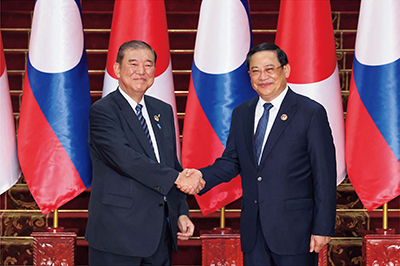 Japan-Laos Summit Meeting (October 11, Vientiane, Laos; Photo: Official Website of the Prime Minister of Japan and His Cabinet)
Japan-Laos Summit Meeting (October 11, Vientiane, Laos; Photo: Official Website of the Prime Minister of Japan and His Cabinet)During Prime Minister Ishiba's official visit to Laos in October, Japan decided to provide grant assistance for the expansion and renovation of facilities at Vientiane International Airport, Laos's primary gateway, to enhance its convenience and safety. Additionally, through cooperation on road rehabilitation, clearance of unexploded ordnance, and disaster risk reduction, Japan and Laos are working to strengthen connectivity within the region's economy and to bolster Laos's resilience.
Today, as attempts to change the status quo by force or coercion are evident around the world and as the international community faces complex crises, maintaining and strengthening a free and open international order based on the rule of law has become an urgent priority. Based on this recognition of the current situation, Japan believes that in addition to traditional cooperative frameworks such as bilateral and multilateral cooperation, it is essential to deepen cooperation across a wide range of fields with like-minded countries based on the Japan-U.S. Alliance in order to maintain peace and prosperity in the region. Accordingly, Japan is working to strengthen cooperative frameworks such as the Japan-Australia-India-U.S. (Quad), Japan-U.S.-ROK, and Japan-U.S.-Australia.
One of the newest frameworks for cooperation among like-minded countries in which Japan participates is the Japan-U.S.-Philippines trilateral partnership. As fellow maritime nations sharing vital sea lanes, Japan and the Philippines have a natural basis for collaboration, and Japan has long sought to strengthen its relationship with the Philippines, a like-minded country with which Japan shares fundamental values and principles. Since 2023 in particular, Japan has worked with both the U.S. and the Philippines to deepen trilateral cooperation under the Japan-U.S.-Philippines framework.
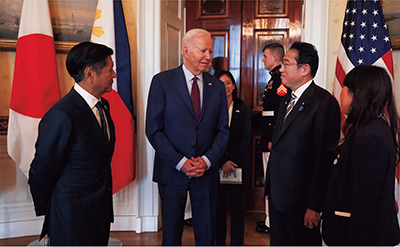 Japan-U.S.-Philippines Summit (April 11, Washington, D.C., U.S.; Photo: Offi cial Website of the Prime Minister of Japan and His Cabinet)
Japan-U.S.-Philippines Summit (April 11, Washington, D.C., U.S.; Photo: Offi cial Website of the Prime Minister of Japan and His Cabinet)On April 11, during Prime Minister Kishida's official visit to the U.S., he held the first-ever Japan-U.S.-Philippines Summit with U.S. President Joseph Biden and Philippine President Ferdinand Marcos, Jr. The three leaders confirmed the importance of freedom of navigation and overflight for regional peace and security, and concurred to oppose and resolutely respond to any unilateral attempts by China to change the status quo by force in the South China Sea and the East China Sea.
Based on the Joint Vision Statement released at this inaugural summit, Japan, the U.S., and the Philippines are elaborating Japan-U.S.-Philippines cooperation across security and economic domains. For example, in the maritime security sphere, the three countries' navies have conducted multilateral joint exercises in the South China Sea. Additionally, the countries' coast guard authorities convened their first high‐level meeting in June and are continuing to strengthen relations. In December, the first Japan-U.S.-Philippines Maritime Dialogue was held in Tokyo. In the Dialogue, given the current situation that the U.S.-Philippines and Japan-Philippines bilateral cooperation in the maritime domain has become even closer, the participants confirmed the practical cooperation promoted bilaterally and concurred to continue and enhance the momentum of trilateral cooperation beyond 2025.
In the economic sphere, based on the Joint Vision Statement's emphasis on the need for close coordination in dealing with economic coercion, Japan, the U.S. and the Philippines held a Trilateral Discussion on countering Economic Coercion and promoting Economic Resilience in October in Manila. In addition, recognizing the importance of promoting the development of strategically critical infrastructure, the Luzon Economic Corridor was launched to support connectivity on Luzon Island. Furthermore, efforts are also being made in a wide range of fields, including telecommunications and energy. In November, the Cabinet Decision approved that Japan would provide Japan-made Open RAN1-related equipment to the Philippines in order to develop a secure communications environment in the Philippines. Moreover, cooperation is also deepening in the cyber domain, with the 1st Japan-U.S.-Philippines Cyber-Digital Dialogue being held in Singapore in October.
As the international community faces a turning point in history and as the security environment surrounding Japan grows increasingly severe, Japan, the U.S., and the Philippines, which share fundamental values and principles, are expected to play a major role in realizing a “Free and Open Indo-Pacific (FOIP).” Japan will continue to strengthen and further develop Japan-U.S.-Philippines cooperation for the peace and prosperity of the Indo-Pacific region and the international community.
- 1 Refers to radio access networks (RAN) that can be built in an open way by a combination of multiple vendors. It offers the advantage of contributing to the mitigation of supply chain risks.
■Relations between Japan and Brunei
Are you familiar with the country of Brunei? Located in northern Borneo, Brunei is a small nation of approximately 450,000 people and an area of about 5,800 square kilometers, roughly the same size as Mie Prefecture in Japan. Despite its small size, Brunei is a Muslim sultanate with a long history spanning more than 600 years. Backed by abundant energy resources, its per-capita gross domestic product (GDP) ranks second in the Association of Southeast Asian Nations (ASEAN), after Singapore, reflecting the stable development it has achieved.
Although Brunei may not be widely known in Japan, it is in fact a country with deep ties to Japan. When Brunei gained independence from the United Kingdom in 1984, Japan was one of the first to establish diplomatic relations with it, and over the ensuing 40 years, the two countries have built an excellent relationship of friendship and cooperation. One of the key pillars of the Japan-Brunei relationship is economic relations, including the energy sector. Brunei's key industry is the production and export of liquefied natural gas (LNG), and 54.7% of Brunei's LNG exports are bound for Japan; about 20 Japanese companies have operations in the country.
Brunei is a constitutional monarchy, and there are active exchanges between the Imperial Family of Japan and the Royal Family of Brunei. His Majesty Sultan Haji Hassanal Bolkiah, the current 29th Sultan, first visited Japan in 1970 to observe the Japan World Exposition 1970 (Expo ‘70) in Osaka, prior to Brunei's independence. Since then, he has visited Japan multiple times both officially and unofficially, and most recently, he attended the Commemorative Summit for the 50th Year of ASEAN-Japan Friendship and Cooperation in 2023. From the Japanese side, Their Imperial Highnesses Prince and Princess Hitachi visited Brunei in 1996 at the invitation of the Sultanate for international goodwill, and in 2004 His Majesty the Emperor, His Imperial Highness the Crown Prince at the time, attended the wedding of Crown Prince Billah in Brunei.
■The 40th Anniversary of the Establishment of Diplomatic Relations between Japan and Brunei
In recent years, Japan-Brunei relations have expanded beyond economic cooperation and exchanges between the Imperial and Royal Families to also encompass security and defense collaboration, as well as people-to-people and cultural exchanges. Like Japan, Brunei is a maritime nation facing the South China Sea, an important sea lane for Japan. Recognizing Brunei's geopolitically important location, since 2020 the Japan Maritime Self-Defense Force and the Royal Brunei Navy have conducted a total of seven goodwill exercises. In the people-to-people and cultural domains, in order to deepen mutual understanding, particularly among the younger generations of both countries and foster future bonds across diverse fields, youth exchanges and inter-university student exchanges are flourishing, through Japan's Friendship Ties Program “JENESYS” program.1 Against the backdrop of this grassroots engagement, Japanese food, anime, and games now gain high popularity in Brunei.
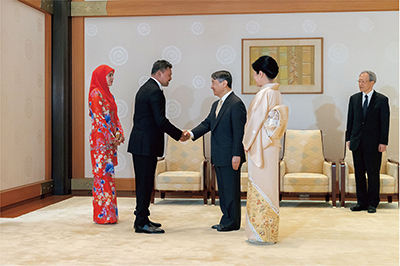 Their Majesties the Emperor and Empress met with Their Royal Highnesses the Crown Prince and Crown Princess of Brunei (March 8, Tokyo; Photo: Imperial Household Agency)
Their Majesties the Emperor and Empress met with Their Royal Highnesses the Crown Prince and Crown Princess of Brunei (March 8, Tokyo; Photo: Imperial Household Agency)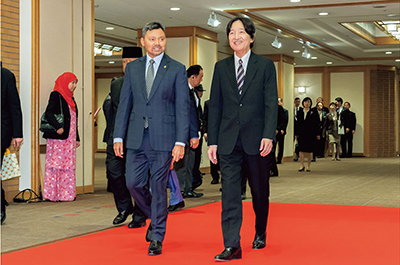 Reception commemorating the 40th anniversary of the establishment of diplomatic relations between Japan and Brunei was held, with attendance by His Imperial Highness Crown Prince Akishino (March 8, Tokyo; Photo: Imperial Household Agency)
Reception commemorating the 40th anniversary of the establishment of diplomatic relations between Japan and Brunei was held, with attendance by His Imperial Highness Crown Prince Akishino (March 8, Tokyo; Photo: Imperial Household Agency)In 2024, Japan and Brunei celebrated the 40th anniversary of the establishment of diplomatic relations. In March, His Royal Highness Prince Haji Al-Muhtadee Billah, Crown Prince and Senior Minister at the Prime Minister's Office, paid an Official Visit to Japan and held a meeting with Prime Minister Kishida, elevating bilateral relations to a strategic partnership. In order to further facilitate people-to-people exchange between the two countries, pursuant to the Notes Verbale exchanged on the occasion of the afore-mentioned Official Visit to Japan, a new visa waiver measure was introduced in December, extending the period of stay without visa for nationals of both countries from 14 days to 30 days.
Looking ahead to the next 10 years, 20 years, and beyond, Japan will continue to place importance on and further develop its relationship with Brunei, a key partner sharing the vision of a “Free and Open Indo-Pacific (FOIP)” based on the rule of law.
- 1 JENESYS is a program intended to encourage understanding of Japan's politics, economy, society, culture, history, and foreign policy, and to cultivate people with great affinity toward or knowledge of Japan by inviting, dispatching, and facilitating online exchanges with emerging future leaders who have influence in public relations between Japan and the Asia-Pacific region.


